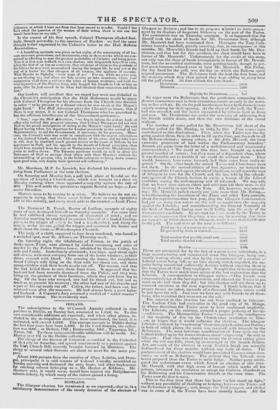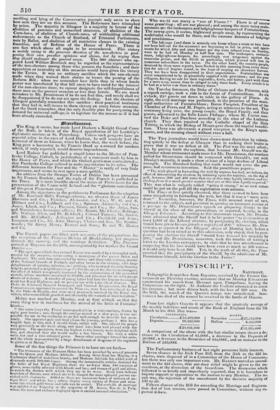SCOTLAND.
The Glasgow election has terminated as we expected—that is, in a satisfactory demonstration of the steady devotion of the electors of
Glasgow to Reform; and has in its proems, alorde I no little amuse- ment by its displays of desperate littleness on the part of the Tories. The nomination was on Thursday sennight. It so happened that the Sheriff took the show of hands for Mr. Dennistoun first, although Mr. Monteith had been nominated first. hereupon time Tory Com- mittee issued a handbill, gravely asserting, that, in consequence of this mistake, Mr. Monteith's friends bad held up their bands for Mr. Den- nistoun, and that but for this accident, the show would have been ha favour of Mr. Monteith ! Unfortunately for the credit of this story, not only Was the show of bands triumphantly in favour of Mr. Dennis- toun, but the assembled multitude, most pertinaciously, though in per_ fect good-humour, refused even to hear Mr. Monteith. But Friday, the day fixed for the poll, was the day on which the Referm spirit reigned paramount. The Reformers took the lead the first hour, and the majority which they then gained they kept mudding toes-cry hour till the poll closed. At four o'clock the vote stood- Dennistoun i049
Monteith Majority for Dennistoun So eager were the Reformers, that the gentlemen composing theit district committees met in their committee-rooms as early in the mom- ing as five o'cle cc. By six the poll-booths were beset by Reform electors
eagerly waiting for their opening. At the close of the poll, the Town- hall was crowded, and the house surrounded by citizens both in front mid rear. Mr. Detinistoun was under the necessity of addressing first his friends within doors, and then the two divisions of the crowd without.
The number of votes polled for Mr. Bennistoun full short of the number polled for Mr. Dunlop, in 'SU by 218. Two csuses have contributed to this diminettion. First, when the Tories saw the day going against them, they, in order to till up the time, put the oath to all the Reform electors ; among others, to Sir Joha Maxwell, the most extensive proprietor of land within the Parliamentary boundary! Second, (to quote from the letter of a well-informed and trustworthy correspon(lent,) " We could at this time have brought up a much greater number of voters ; but they were of a dependent class, whom it was desirable not to trouble if we could do without them. They would, however, have come forward, hai their votes been really re- quired." On the other hand, the united Tee ies and Churchmen were not slack. In the second edition of last Spectates, we noticed the excursion of the Church-ageet, the alien Colqubsam, to call upon the men of Glasgow to vote for the Church, and the lies told by the subordi- nate agents of the Church faction to excite a horror of the Liberal candidate among the well-meaning and ill.ittformed. We snay add, that no fewer than sixteen elders and ministers left their seats in the General Assembly to vote for the Tory. All, however, was unavail- file : Mr. Monteith pulled exactly one vote more than Mr. Ewing,— notwithstanding the assertions of the Times and other Tory journals... about the registration.time lust year, that the Glasgow Conseivatiees had put as many new voters on the roll as would turn the inajioity against the Liberals; and notwithstandieg the General Assembly of the Kirk of Scotland having cast itself bodily into the 'wale of the Conservative caudidate. An attempt has et, made by the Tories tu create an impreseien that they have a rest , cc, by assert mug that there are epwarls of 8,000 electors in Glasgow, m hile fewer than lir ita) came to the poll. The teal stste of the C4s5C is as follows : Tutal nuu.ber ui Haines on the roll $47
Di,qualitleal by death or removal Total number that possibly could vote bran Total uutuber that did vote Residue 1106
These are arcomited for by the. fact of a great many individuals, in a large manufacturing and commercial town like Glasgow, hieing con- stantly moving about ; and also by the circumstance of a number of Liberal voters being left, as we have already stated, unpolled, the ma- jority being considered sufficiently decisive without exposing them to the vengeance of their Tory employers. It ought also to be mentioned, that the Tories were much more active at the last registration than the Liberals. A correspondent in Glasgow writes—" Our friends were comparatively lax at the last registration, and allowed the Tories to put more on the roll than (lay did : butt this election will stir them up to renewed exertions at the next registration. I firmly believe, that if proper means are taken, upwards of a thousand Reform voters could be put upon the roll. Just now we have met with friends in all direc- tions, who regretted they were not on the roll." The interest in this election has not been confined to Glasgow. The Carlton Club had emissaries in the good city of St. Mange, to whose directions the Tories seem to have conformed implicitly. The Liberals, on the contrary, evinced a proper jealousy of forsigst interference. The Metropolitan Tories " expressed " the intelligence of the majority of five on the Church-rates resolution to Glas- s)w, in hopes that it would influence the election. The Glasgow Liberals retaliated, by "expressing " their victory to London mend Dublin ; in both of which places the news was received with triumph by the Reformers. The most ludicrous manifestation of Tory spite was the hubbub kicked up by Sir James Graham about" expressing " the writ to Glasgow. That step was adopted to insure the elsetion taking place while the roll was full; since, by an Oversight in the Scotch Reform Act, one-sixth of the electors in every Scottish burgh are annually disfranchised for three months, without any fault of theits. The postponement of the election would have prevented Conservatives from voting its well as Reformers. The pretext that the Liberals were better prepared than the Tories is mere fudge. Neither party antici- pated the unfortunate event which forced an election at this time. Mr. Oswald, with that high sense of honour which marks all his actions, intimated his resolution to accept the Chiltern- Hundreds to his Reforming and hia Conservative friends at the same time. The Tories were the first to move.
This is the first time that there has been "a fair stand- up fight," without any possibility of skulking or hedging, between the Tories :old the Reformers in Glasgow; and, maugre the Peel banquet, and all that was to come of it, the Tories have been soundly beaten. All the
cavilling and lying of the Conservative journals only serve to show how sore they are on this account. The Reformers have triumphed by union. The majority in Glasgow is a majority in favour of the abolition of pensions and unmerited sinecures, of abolition of the Corn-laws, of abolition of Church-rates, of withholding additional endowments to the Church of Scotland, of Triennial Parliaments, cote by Ballot, and abolition of all restrictive clauses in the existing franchise, and of Reform of the House of Peers. There is one fact which above all ought to be remembered. This victory is mainly owing to the generous devotion of the non-electors in post- poning their own peculiar opinions and claims, lest by urging them they should endanger the general cause. The 900 electors who op- posed Lord William Bentinck may be regarded us the representatives of the non-electors among those who possess the franchise ; and their opposition or neutrality on this occasion would have given the victory to the Tories. It was no ordinary sacrifice which the non-eleetors made when they waived their claims to insure the passing of the Reform Bill : when we remember how little they to whose hands power was transferred by that bill seem to have cared for the interest of the non-electors since, we cannot designate the self-forgetfulness of these men on the present occasion as less than heroic. We are much mistaken in Mr. Dezmnistoun if he do not feel this, and sorely shall we be disappointed if be do not act upon the feeling. Let the electors of Glasgow gratefully remember this sacrifice : their practical testimony that they feel it, will insure to theta victory on every future occasion. Let the timid remember, that the only feasible plan for postponing the demand for universal suffrage, is to legislate for the masses as if it had been already conceded.



























 Previous page
Previous page